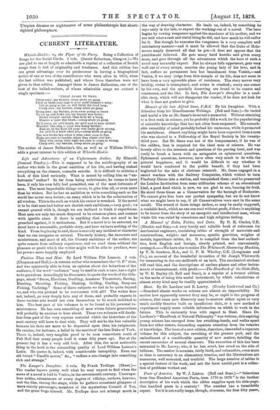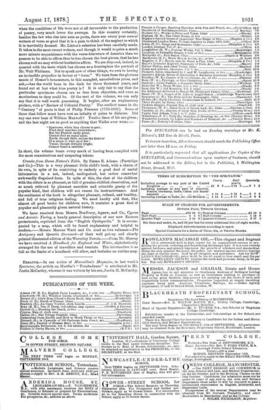Poets of America. By W. J. Linton. (Bell and Sons.)—"
Selections from One Hundred American Poets, from 1776 to 1876" is the further description of his work which the editor supplies upon his title-page. One hundred poets in a century ! The number has a formidable aspect. Yet it is not really large, though, of course, the first fifty years, when the conditions of life were not at all favourable to the production of poetry, very much lower the average. In this country certainly, bosides the few who rise into note as poets, there are every year several writers of verse so good that it is a pain to think of the neglect to which it is inevitably doomed. Mr. Linton's selection has been carefully made. It takes in the most recent writers, and though it would require a much more minute acquaintance with the verse-literature of America than we possess to be able to affirm that he has chosen the best pieces, that he has chosen well we may without hesitation affirm. We are disposed, indeed, to quarrel with the taste which has chosen as a frontispiece the portrait of Mr. Walt Whitman. Not to speak now of other things, we own to having an invincible prejudice in favour of "form." We turn from the glorious music of Homer's hexameters, to this mangled, unmelodions prose, and ask,—has the world been in the dark for three thousand years, and found out at last what true poetry is ? It is only fair to say that the particular specimens chosen are as free from objection, and even as meritorious as they could be. Of the rest of the volume, we can only wry that it is well worth possessing. It begins, after an explanatory preface, with a" Review of Colonial Poetry." The earliest name in the " Century " of poets is that of Philip Freneau (1752-1832). Some of those that follow must have cost an infinity of pains to disinter. Did any one ever hear of William Maxwell ? Twelve lines of his are given ; and the last eight are as good as anything that Waller over wrote
Sparrows, when they choose to pair, Find their matches everywhere; But the Phoenix, sadly great, Cannot and an equal mate. Earth, though dark, enjoys the honour Of a moon to wait upon her ; Venue, though divinely bright, Cannot boast a satellite."
In short, the volume bears every mark of having been compiled with the most conscientious and unsparing labour.































 Previous page
Previous page